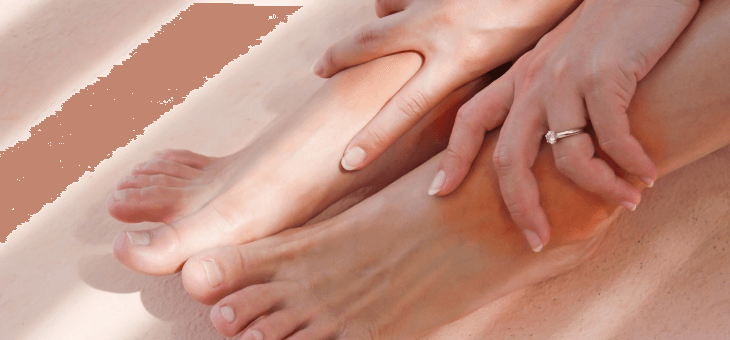We all love a holiday but long flights certainly come with their perils – one of which is swollen ankles.
Yes, they’re uncomfortable and unsightly, but should they also be cause for concern?
We asked nutritionist and author Dr Sarah Brewer to give us the lowdown on swollen ankles and share her tips on how to reduce or prevent them.
Why do you get swollen ankles?

“Swollen ankles are usually a sign of poor circulation,” says Dr Brewer. “Blood sent to the feet has to return to the heart against gravity. If the heart pumps poorly, or if the vein valves that stop backflow are incompetent (as is the case with varicose veins) blood can pool in the lower legs.”
This build-up of fluid leads to puffiness, meaning your ankles swell up.
Other causes of swollen ankles include circulatory changes when pregnant, side-effects of medication that cause blood vessels to dilate, fluid retention or changes in the blood fluid composition due to kidney problems or liver disease, blood clots (DVT), swelling of lymph drainage vessels, or swelling due to compression of blood vessels.
Being overweight can also worsen swelling.
Read: How flying affects your body
Are they cause for concern?
If swollen ankles are more long-term than just the result of warmer weather or flying, it’s worth going to your GP to check if it’s not anything more serious.
“If persistent, seek medical advice to check for blood pressure, heart, kidney, liver and circulatory problems,” Dr Brewer says.
Why do your ankles swell on aeroplanes?

“Circulation to the legs is reduced due to inactivity, as the pumping action of leg muscles during walking helps blood return to the heart,” she explains. “Also, reduced cabin pressure makes it easier for fluid in the circulation to seep out into the tissues.”
Essentially, sitting in one place in a low cabin pressure, means that you’re more likely to experience stiffness and swelling – that’s why your shoes often feel tighter at the end of a flight.
Read: Experts reveal the worst food you can eat while flying
So what can you do to prevent them?
1. Stand up and move around several times an hour. Perform leg exercises when sitting – especially on longer flights.
2. Avoid alcohol (which causes blood vessels to dilate).
3. Store bags overhead so they don’t take up space under the seat in front of you, which will restrict movement even more.
4. Book an aisle seat so you can get up and move around more easily.
5. Drink plenty of water so you remain well hydrated.
6. Avoid excess salt, which promotes fluid retention.
7. Support socks and stockings are available but should be fitted properly (ask a pharmacist to help you).
8. You should also avoid crossing your legs, as this puts even more pressure on your veins.
Why do they swell in hot weather?

Swollen ankles come down to your blood circulation, which changes when the weather heats up.
“Blood is diverted towards the peripheries to help cool you down, and dilation of blood vessels makes it easier for fluid to seep out into the tissues,” Dr Brewer says.
Luckily, you’re more likely to be sporting thongs and sandals in the summer months, so you don’t have to shove your swollen feet into shoes if you don’t want to.
If you want to avoid swollen ankles in the summer, try the following:
1. Stay in the shade as much as possible.
2. Exercise your feet and legs when sitting down.
3. When sitting, keep your legs up so your ankles are more on a level with your heart.
4. Avoid excess salt and drink plenty of water to maintain good hydration.
Read: How to overcome a fear of flying
How can you treat them?

If you persistently suffer from swollen ankles, Dr Brewer recommends taking diuretic tablets, which “can help reduce fluid swelling by helping to flush more fluid through the kidneys”.
You should, of course, seek medical advice if the problem becomes serious, but following Dr Brewer’s tips above will help reduce the problem when the weather is hot, or if you’re going overseas.
– With PA
Health disclaimer: This article contains general information about health issues and is not advice. For health advice, consult your medical practitioner.

